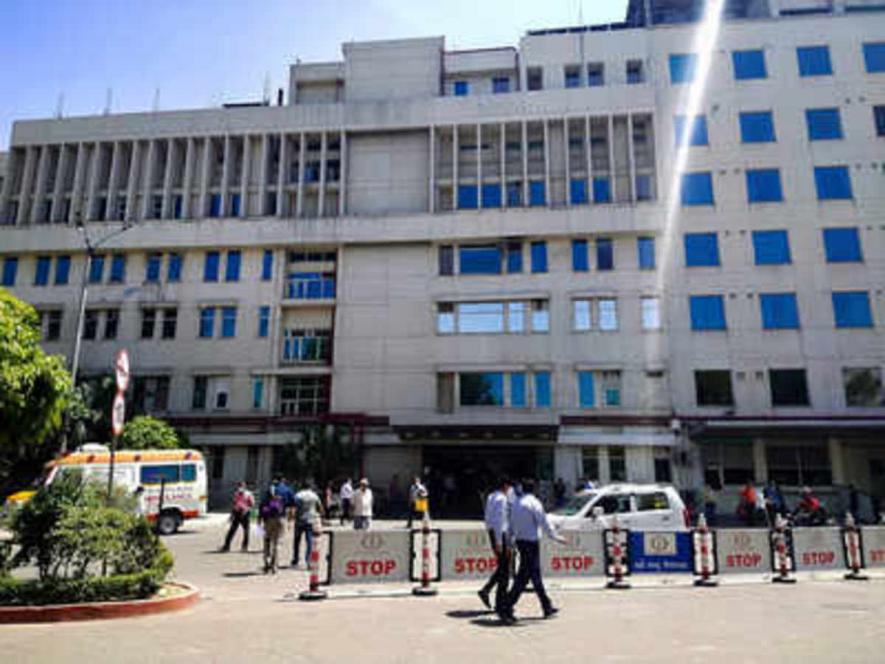COVID-19: Five Suffer from Rectal Bleeding after CMV Infection at Ganga Ram Hospital, One Dead

Image Courtesy: Times Of India
New Delhi, June 29: Five COVID-19 patients at a leading private facility here have suffered from cytomegalovirus-related rectal bleeding during the second wave of the COVID-19 pandemic, the hospital authorities said on Tuesday and claimed that it was being reported for the "first time" in immunocompetent persons.
These patients reported at the facility 20-30 days after their COVID-19 diagnosis, doctors at the Sir Ganga Ram Hospital said.
Until now, the infection affected only immunocompromised patients – post-transplant, cancer, AIDS etc. but this is the "first time in India" that cases of CMV-related rectal bleeding in COVID-19 immunocompetent patients have been reported, a spokesperson of the hospital said.
According to Professor Anil Arora, chairman, Institute of Liver Gastroenterology and Pancreaticobiliary Sciences at the hospital: "During the second wave of the pandemic, in April-May, we have seen five cases of the CMV infection in otherwise immunocompetent patients with COVID-19."
These patients presented with pain in abdomen and bleeding during stool discharge. None of them had other predisposing immunosuppressed states accounting for this viral infection, he said.
COVID-19 itself and the medicines used for its treatment (like steroids) do suppress the immunity of patients and make them susceptible for uncommon infections with varied presentations, the hospital said in a statement.
"One such opportunistic infection is from CMV Cytomegaloirus and it exists in 80% to 90% of the Indian population in asymptomatic form as our immunity is strong enough to make it clinically asymptomatic. Clinical presentation with symptoms secondary to CMV is usually seen in patients whose immunity is compromised," it said.
But in these five cases, all patients presented with a "low lymphocyte count (six to ten per cent as against a normal of 20%-40%)", indicating Covid-induced suppression of immunity predisposing them to symptomatic reactivation of the CMV infection, doctors said.
These patients in the age group between 30 and 70 years of age are from Delhi-NCR and four of them had presented with a lower gastrointestinal bleed, which is bleeding in stools, and one of them presented with intestinal obstruction, the statement said.
"Two of them had massive bleeding, one requiring an emergency life-saving surgery in the form of the removal of the right side of the colon, while one of them succumbed due to massive bleeding and severe COVID-19 chest disease," the hospital said.
The three other patients were successfully treated with antiviral therapy with ganciclovir, Arora said.
"Cytomegalovirus colitis was confirmed by PCR testing for CMV viremia and tissue biopsy from the large intestine, which showed intranuclear inclusion bodies which was further confirmed to be due to the CMV infection by the specific immunohistochemistry stains," said Dr Sunila Jain, a senior consultant pathologist at the hospital.
In such cases, a high index of suspicion and timely intervention in the form of an early diagnosis and effective antiviral therapy can save many a precious lives, opined Dr. Praveen Sharma, senior consultant at the hospital's gastroenterology department.
Meanwhile, the Moolchand hospital said in a statement that new cases and the flaring up of old anal fissure and piles in many COVID-19 patients or those in the recovery phase have been reported in the last few months.
A post-Covid patient, a 55-year-old man, had come as an OPD patient to the surgical department of the hospital with a four-day history of bleeding in the rectum, along with painful defecation for the last 12 days, the hospital authorities said.
The patient said he had been drinking four-five glasses of "kadah" a day for the last three months, doctors said.
He was treated surgically and discharged in 24 hours. Subsequently, his symptoms were found to have completely disappeared, the statement said.
According to Dr Sachin Ambekar, consultant, department of laparoscopic and minimal access surgery at the hospital, "Since March, I have regularly been seeing three to five OPD patients a day coming with symptoms of anal fissures and piles. On probing, patients have been found to be following home remedy treatments sent on WhatsApp groups."
They have apparently been overdosing themselves with vitamin D, vitamin C as also herbal and "kadah" preparations and which have, in the long term, flared up the symptoms of an existing fissure or piles. Moreover, even new cases of acute anal fissures have been observed, he said.
Ambekar said "overzealous use of 'kadah', a herbal home-made concoction, is a leading cause of piles and anal fissures in COVID-19 and post-COVID-19 patients".
These hot concoctions over a period of time dry up the mucous lining or membrane of the stomach and intestines, causing severe constipation and thus, leading to anal fissures. Earlier, anal fissure with piles were termed as lifestyle diseases. In the present scenario, it is a "self-styled disease" caused due to the stress and fear of contracting COVID-19, the doctor said.
Ambekar has "surgically treated roughly 350 patients of anal fissure and piles related to post COVID-19 home remedy therapies" since March, the hospital claimed, adding that many of them required surgical intervention like laser therapy, MIPH, while some were managed conservatively.
Get the latest reports & analysis with people's perspective on Protests, movements & deep analytical videos, discussions of the current affairs in your Telegram app. Subscribe to NewsClick's Telegram channel & get Real-Time updates on stories, as they get published on our website.
























